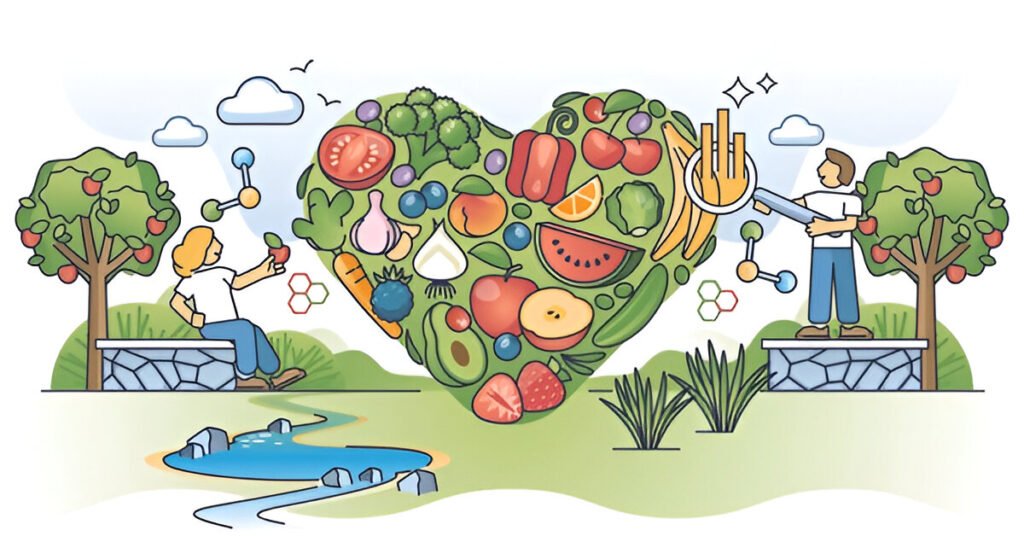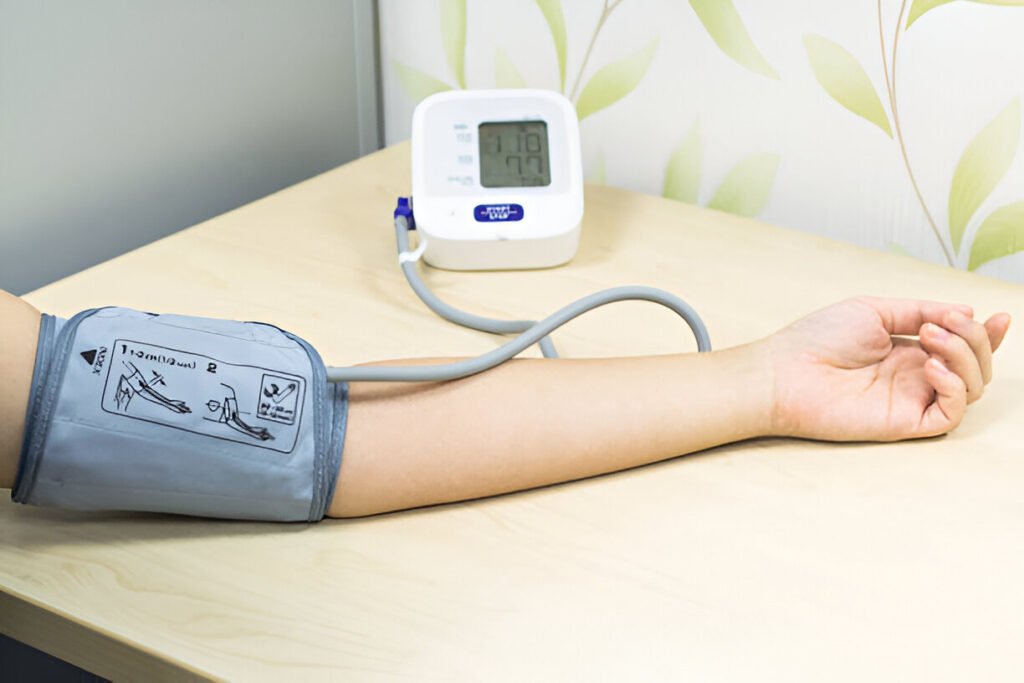High blood pressure, or hypertension, is a medical condition marked by the consistent elevation of blood pressure against artery walls, typically defined as a reading of 130/80 mmHg or higher. This condition can often go unnoticed, making it essential to monitor regularly. If left unmanaged, hypertension can lead to severe health complications, including heart disease, stroke, and kidney damage, highlighting the critical importance of understanding and maintaining healthy blood pressure levels.
Natural methods for managing high blood pressure are effective and focus on holistic lifestyle changes. Key strategies include dietary modifications, increased physical activity, stress management techniques, and the use of herbal remedies. These approaches help lower blood pressure and contribute to overall well-being, making them a vital part of a healthy lifestyle.
In the following sections, we will delve into specific dietary changes, such as reducing sodium intake and incorporating more fruits and vegetables, alongside recommended exercises and stress-reduction practices like mindfulness and yoga. By adopting these natural strategies, individuals can take proactive steps toward managing their blood pressure and improving their long-term health outcomes. Managing high blood pressure naturally requires the following key strategies:
1. Understanding High Blood Pressure
Understanding high blood pressure involves recognizing its causes and risk factors, which can be genetic and lifestyle-related. Family history significantly influences an individual’s likelihood of developing hypertension. Additionally, lifestyle choices such as poor dietary habits, insufficient physical activity, and excessive alcohol consumption can elevate blood pressure. Environmental factors like chronic stress and exposure to pollutants also play a role, increasing the overall risk of hypertension.
Hypertension is often referred to as a “silent killer” because it may not present noticeable symptoms, making it difficult to detect until serious complications arise. While some individuals may experience headaches, dizziness, or nosebleeds in severe cases, many remain asymptomatic. The long-term health implications of unmanaged high blood pressure are grave, potentially leading to heart attacks, strokes, heart failure, and kidney disease, underscoring the importance of early detection and proactive management.

2. Dietary Changes
Dietary changes are essential for effectively managing high blood pressure, as nutrition plays a foundational role in cardiovascular health and maintaining a healthy weight. A balanced diet supports overall well-being and helps regulate blood pressure levels. Incorporating the right foods into daily meals can make a significant difference in both short-term and long-term health outcomes.
Key dietary recommendations for lowering blood pressure include increasing the intake of fruits and vegetables, which are rich in potassium, magnesium, and fibre. It takes these nutrients to keep blood pressure in a healthy range. Additionally, choosing whole grains over refined grains can promote heart health due to their high fibre content, which is linked to lower blood pressure. It’s also vital to reduce sodium intake to less than 2,300 mg daily, as high sodium levels are associated with elevated blood pressure. Including heart-healthy fats from foods like almonds, avocados, and olive oil will help improve heart health even more.
Specific foods to include in a hypertension-friendly diet are leafy greens such as spinach and kale, which are high in potassium and help balance sodium levels. Berries like blueberries and strawberries are rich in antioxidants that may assist in lowering blood pressure. Moreover, beets and bananas are excellent choices, as both are high in potassium and have demonstrated benefits in supporting healthy blood pressure levels. By making these dietary adjustments, individuals can take meaningful steps toward managing their blood pressure naturally.
3. Physical Activity
Regular physical activity is a crucial component in managing high blood pressure, as it strengthens the heart and improves its efficiency in pumping blood. This enhanced cardiovascular function can lead to significant reductions in blood pressure levels. Engaging in a consistent exercise routine not only helps lower blood pressure but also promotes overall health and well-being.
To effectively lower blood pressure, various types of exercises are recommended. Aerobic exercises such as walking, jogging, cycling, and swimming are particularly beneficial, as they can have a direct and significant impact on lowering blood pressure. Additionally, incorporating strength training with weights or resistance bands can enhance cardiovascular health and overall fitness. Flexibility and balance exercises, including yoga and stretching, contribute to improved well-being and stress reduction, which further aids in blood pressure management.
Establishing a consistent exercise routine is vital for reaping these benefits. Try to get in at least 150 minutes a week of moderate-to-intense aerobic exercise or 75 minutes of vigorous activity. In addition, include muscle-strengthening activities on two or more days to support overall fitness. By making physical activity a regular part of your lifestyle, you can effectively manage your blood pressure while enhancing your overall health.
4. Stress Management
Stress management plays a crucial role in controlling blood pressure, as chronic stress can trigger unhealthy behaviours like poor dietary choices and increased alcohol consumption, both of which contribute to hypertension. Recognizing the link between stress and blood pressure is essential for implementing effective strategies to manage stress levels and promote overall well-being.
Several techniques can be employed to reduce stress effectively. Mindfulness and meditation practices enhance mental clarity and can significantly lower anxiety, helping to mitigate stress-related blood pressure spikes. Additionally, deep breathing exercises, particularly diaphragmatic breathing, can quickly reduce stress levels and promote relaxation. Activities such as yoga and Tai Chi blend physical movement with meditation and controlled breathing, providing a holistic approach to lowering stress and blood pressure.
Moreover, prioritizing quality sleep is vital for effective stress management and overall health. Adequate sleep—ideally between 7 to 9 hours per night—helps regulate blood pressure and improves the body’s resilience to stress. By integrating stress-reduction techniques and ensuring sufficient rest, individuals can better manage their blood pressure and enhance their overall quality of life.
5. Lifestyle Modifications
Making lifestyle modifications is essential for effectively managing high blood pressure. One of the most significant changes individuals can make is to avoid tobacco and limit alcohol consumption. It is well-recognised that smoking raises blood pressure and that drinking too much alcohol can cause hypertension. Practising moderation is crucial; reducing or eliminating these substances can have a profound impact on blood pressure levels and overall health.
Another important factor in managing hypertension is maintaining a healthy weight. Being overweight or obese significantly increases the risk of developing high blood pressure. Achieving and maintaining a healthy body mass index (BMI) through a balanced diet and regular exercise is vital for reducing hypertension risk. This not only helps in blood pressure management but also enhances overall cardiovascular health and well-being.
Regular monitoring of blood pressure is also a key component of effective management. Keeping track of your blood pressure at home allows you to notice any trends or fluctuations, providing valuable information to discuss with your healthcare provider. By being proactive about lifestyle changes and monitoring your health, you can take significant steps toward managing your blood pressure and improving your long-term health outcomes.

6. Herbal Remedies and Supplements
Herbal remedies and natural supplements can play a supportive role in managing blood pressure and promoting cardiovascular health. Omega-3 fatty acids, commonly found in fish oil, are known for their ability to lower blood pressure and enhance heart function. Additionally, Coenzyme Q10 serves as a powerful antioxidant that may also help in reducing blood pressure levels. Garlic extract has shown modest effects in lowering blood pressure, making it a popular natural option for many seeking to improve their heart health.
However, before beginning any supplement program, it is imperative to speak with a healthcare professional. This is important to ensure that the supplements do not interact with existing medications or conditions. Professional guidance can help tailor a safe and effective approach to using herbal remedies and supplements as part of a comprehensive strategy for managing blood pressure and improving overall health.
Conclusion
Managing high blood pressure naturally requires a holistic approach that encompasses various lifestyle factors, including diet, exercise, stress management, and other lifestyle modifications. By integrating these elements, individuals can create a comprehensive strategy to effectively lower their blood pressure and support overall cardiovascular health.
It is essential to seek professional guidance when implementing these natural methods. Collaborating with healthcare providers ensures a personalized and safe approach to managing hypertension, taking into account individual health needs and potential medication interactions. Professional support can help refine strategies and provide valuable insights tailored to each person’s unique situation.
The long-term benefits of adopting these natural strategies extend beyond just lowering blood pressure; they significantly enhance overall quality of life. By embracing healthier habits, individuals can reduce their risk of chronic diseases, improve their well-being, and promote a more vibrant and active lifestyle. These positive changes contribute to better health outcomes and a more fulfilling life.





